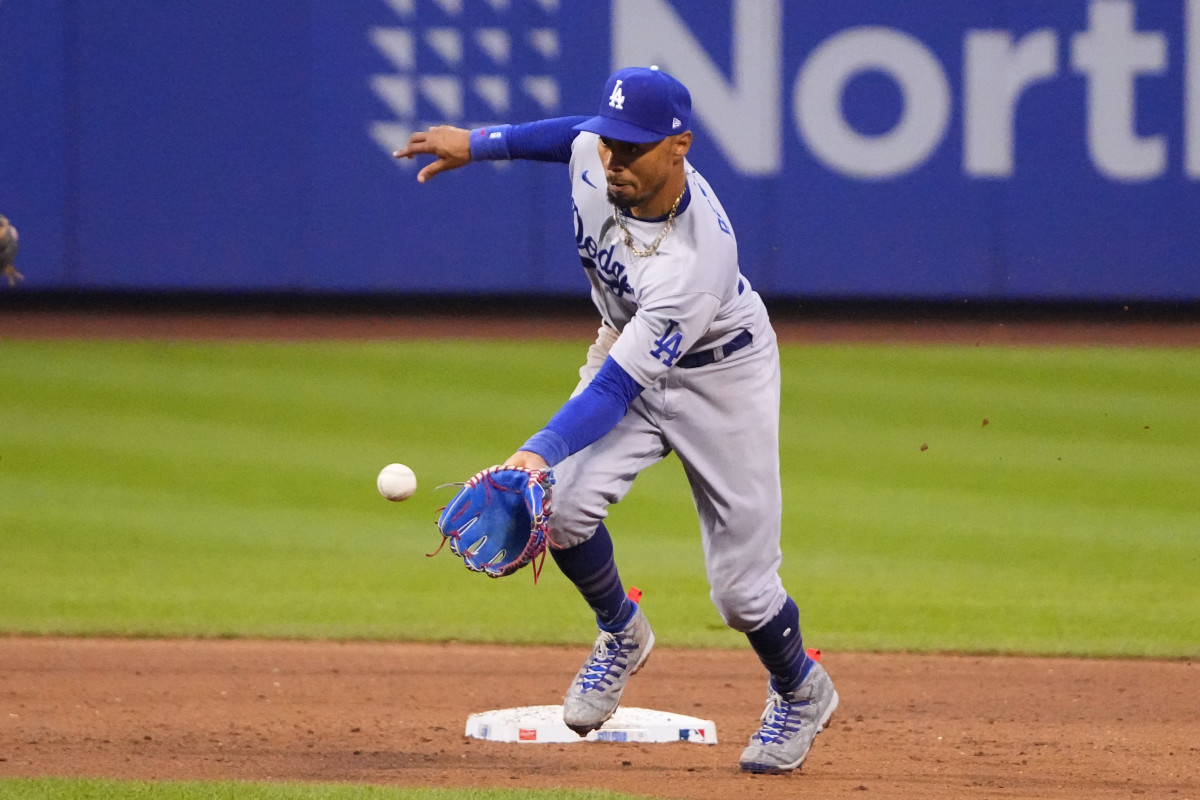Mookie Betts Has Found Joy Playing the Infield This Season, and the Results Show

Mookie Betts had been asking for years, but his bosses said no so many times that he stopped expecting a yes.
So when Dodgers manager Dave Roberts told him this spring that nine years into a reluctant career as an outfielder, Betts could become an infielder again, he was briefly unsure how to feel. He quickly settled on elation.
He is happier this season than he has been in years, he says. “Not on purpose!” he adds. “It just kind of happened.”
The people around him have noticed. His old friend J.D. Martinez (with whom he played for two years in Boston before being reunited this season in Los Angeles) says Betts seems to be having more fun.
Roberts says he has barely seen Betts without a smile this year. “There’s just a lot of joy,” the skipper says, “where I think in the last couple of years it’s been kind of in and out for various reasons.”
And the results are there: Betts is quietly assembling his best season since his 2018 MVP year. Through Monday, he was second in the National League in WAR (4.5) and had just extended a six-game hitting streak during which he batted .520 with a 1.706 OPS. But he’s proudest of what he has done on defense.
The Red Sox selected him as a second baseman in the fifth round of the 2011 draft, but when they signed incumbent Dustin Pedroia to an eight-year, $110 million extension in ’13, Betts needed a new home. The team moved him to right field, the position at which he won six Gold Gloves in the last seven years—the first four for Boston and the last two for the Dodgers. But Betts always wanted to play second base.

“I’m a natural-born infielder,” he says. “I got moved to the outfield. I didn’t play my way into the outfield. You can argue that I’m proving other people wrong, but it’s really just proving myself [right]. I’ve been saying I can do it.”
For a long time, the Dodgers ignored him, just as the Red Sox had. They let him fill in during emergencies but mostly stuck to what worked.
“It was just more of looking at the landscape of the roster,” says Roberts. “It just didn’t make a lot of sense, as far as who we had playing the infield and then who we had potentially backfilling Mookie in right field.”
But in March, second baseman Gavin Lux tore his ACL, and in April, shortstop Miguel Rojas strained his hamstring, and Chris Taylor, who can play anywhere but catcher, left a game with left side discomfort. Los Angeles had three quality outfielders in David Peralta, James Outman and Jason Heyward. And Betts had been taking ground balls at second before games all season—just as he has for years—to keep himself sharp.
“O.K.,” Roberts told Betts. “You’re up.”
“I do think that he was surprised when we finally put it into action,” Roberts says. “I just can’t say enough about how open and willing he's been to help us out.”
Betts has started 54 games in right, 22 at second and 12 at shortstop. He often plays two or all three positions in nine innings, and four times he has even shifted midgame from the outfield to the infield, an especially difficult transition because fielders lose fractions of a second of reaction time.
Some players might find that task exhausting. Betts loves it. He had to struggle to maintain his focus in the outfield sometimes, he says, but moving around “keeps me engaged.” He has found joy at work again.
If not for Shohei Ohtani’s unthinkable season as a pitcher and a hitter, Roberts thinks we might all be talking about what Betts has done. The manager cannot immediately think of another player who has matched him. Taylor and Enrique Hernández played all over the diamond for the Dodgers but never produced the kind of offense Betts brings. Kris Bryant won the 2016 NL MVP award with the Cubs while playing six positions but was not an elite defender anywhere.
“To now have a guy play short, second and Gold Glove right, and to hit and have MVP-type offensive numbers, it’s like … ” Roberts trails off.
He’s not sure what it’s like. It’s like nothing he’s ever seen before. It’s like nothing anyone—even Betts—could have imagined.
